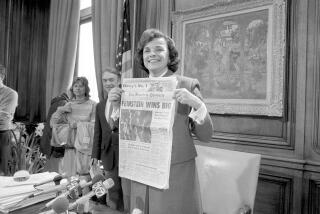Florence Mahoney, 103; Health-Care Activist Pushed Institute on Aging
- Share via
Florence Mahoney, a health-care advocate who was instrumental in creating the National Institute on Aging and expanding the National Institutes of Health that contains it, died at home in the Georgetown section of Washington on Nov. 29. She was 103 and died of natural causes.
A presence in Washington political circles from the time of President Harry S. Truman, Mahoney lobbied for government-sponsored health care, health insurance and medical research, often using small dinner parties in her home as her platform. She built a network of contacts that included politicians, doctors and research scientists, calling on them to help push her causes through Congress.
She and her colleague, the heiress and humanitarian Mary Lasker, were early advocates of research on mental illness, heart disease and Alzheimer’s disease. They were among the first to foresee the health concerns that would accompany the country’s increasing older population and began to press for the Institute on Aging in the early 1960s.
The office was finally approved by President Nixon in 1974 after he twice vetoed the proposal. Opponents, including the American Medical Assn, had called it an example of socialized medicine.
“Florence was nothing if not persistent,” said Mary Margaret Valenti, secretary to Lyndon B. Johnson when he was a U.S. senator. “Florence was a lobbyist in the best sense. She would not give up until finally Sen. Johnson would say, ‘OK, OK, OK!’ ”
Last year in Washington at her 102nd birthday party and the launching of the book “Noble Conspirator: Florence S. Mahoney and the Rise of the National Institutes of Health,” by Judith Robinson, Mahoney’s guests included former Arizona Gov. Bruce Babbitt, who credited her with getting him started in politics in 1969. He told how the two of them were shopping one day in Mexico and later stopped at “a cowboy bar” in Tubac, on the Arizona side of the border.
Babbitt said Mahoney told him, “Bruce, now is the time to start on your political career.” Surveying the tough-looking characters in the bar, she added, “This is a great place to start campaigning. I’m going to introduce you to this audience.”
“I learned a lesson,” Babbitt said. “Take a position and act upon it. That’s Florence.”
Babbitt said Mahoney also influenced his positions on health care. “She said any health-care program needs to be universally available and needs cost containment without eliminating anyone from qualifying for it.” What came of their discussions was a managed-care health insurance program for the state, said Babbitt, who was governor from 1978 to 1986.
Growing up as one of three daughters on a farm near Muncie, Ind., Florence Sheets wanted to be a physician. After graduating from high school in 1917 she studied anatomy and kinesiology at the Normal School of Physical Education in Battle Creek, Mich. She later taught physical education and took courses in medicine.
In 1926 she married Daniel J. Mahoney, a newspaper executive who became publisher of the Miami Daily News. They lived in Miami, Washington and New York City, and she wrote a column for the newspaper, which gave her access to political leaders and helped focus her concerns.
Mahoney’s passionate interest in health issues grew step by step. In the 1930s she volunteered at Miami hospitals. She focused on mental health when a friend asked her to help raise money for a clinic. She used her newspaper connections to get articles published on an unfit mental institution in Florida and, afterward, using her husband’s political connections, gained access to state legislators to push appropriating more state money for mental health care. Several million dollars were added that year.
Her path was set. She had combined her devotion to health-care issues with her access to politicians and seen her plan for reform put into effect.
Mahoney and her husband, who had two children, divorced in 1950; soon after, Mahoney made Georgetown her home.
Clad in a sheath dress and sporting a double strand of pearls and a bouffant hairstyle -- the uniform of a Washington socialite in the 1960s -- Mahoney charmed senators and House members by taking them homemade lunches, and then stayed to ask their advice on how to get her projects funded.
One of her more controversial causes was a national birth control program. Among guests she invited to her home for tea and conversation about the topic were several papal nuncios, representatives of the Vatican in the U.S.
“She’d entertain one papal nuncio, trying to talk the Catholic Church into changing its anti-birth control position,” said Stephen Strickland, a longtime friend of Mahoney and chairman of the National Peace Foundation. When she received no encouragement from one, she would wait for the next to be appointed and try again, Strickland said.
In recent years she proposed that anyone who wanted to have a baby be required to be licensed.
Although she was conscious of fitness and health, she was not obsessive, Strickland said. She loved caviar. To keep fit, she swam in a neighbor’s pool and sometimes did ballet stretches while talking with friends. “It was all quite natural,” Strickland said.
Mahoney is survived by one son, J. Michael Mahoney, and grandchildren.
More to Read
Sign up for Essential California
The most important California stories and recommendations in your inbox every morning.
You may occasionally receive promotional content from the Los Angeles Times.













